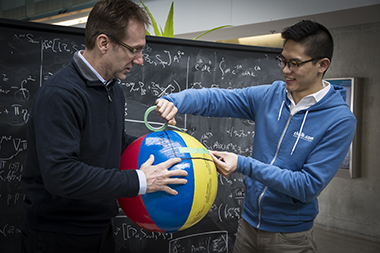William Zhou loves the way science fiction gets people thinking about possibilities. He fondly recalls the favourite shows of his youth — Dr. Who and Battlestar Galactica.
But Interstellar, a film about time, black holes and the weird stuff that might happen when you throw people into the mix, left him absolutely certain about the course his own business was on with the Perimeter Institute for Theoretical Physics.
“I’ve always been interested in physics and space — any kid is,’’ says Zhou, CEO of Chalk.com, a developer of instructional tools for teachers. “When Interstellar came out, I left the theatre just dazed. I thought, as a species, we’re so small. It just boosted my interest in physics so much more.
“Two months later, we signed a partnership with Perimeter.”
A graduate of the University of Waterloo’s Velocity program, Chalk.com recently moved to offices on the sixth floor of 305 King St. W., Kitchener, a short walk from the Communitech Hub.
Out-of-this-world content
Today, Perimeter and Chalk announced a collaboration: Perimeter’s science lessons will land on Planboard, Chalk’s digital suite of teaching services. It is Chalk’s first offering of fee-based, premium content.
Teachers — more than 100,000 of them at the moment — already use Planboard to build lessons, map out teaching schedules and manage marking.
They can add their own material, including video, to their Planboard account, and Planboard helps them keep track of curriculum. Chalk.com also produces Markboard, an analytical tool to chart student performance.

Greg Dick of the Perimeter Institute (left) and William Zhou of Chalk.com
try one of Perimeter’s hands-on classroom activities, which explains Einsteinian
curved space. It is one of dozens of Perimeter resources now available through
Chalk.com’s collaboration platform. (Photo: Gabriela Secara, Perimeter Institute)
Since its start in 1999, Perimeter has taken the public along on its exploration of curious things and theories in the universe.
It regularly holds open lectures and special events featuring resident and guest researchers. Its educational packages, covering such topics as quantum mechanics and Einstein’s ideas about gravity, space and time, now reach about four million students in Grades 7-12 in more than 30 countries.
Perimeter puts together science kits that fit into a hard plastic case about the size of a magazine. The kits include a DVD and a booklet loaded with activities to teach complicated ideas using ordinary things — a beach ball and masking tape, for example – to demonstrate curved space-time.
“You’re teaching kids that science is more than just a body of memorized facts,” says Greg Dick, Perimeter’s Director of Educational Outreach. “It’s a process. It’s a mysterious, wonderful activity.’’
Moving the lessons to Planboard, Dick says, opens up more opportunities for teachers to customize and collaborate online with colleagues.
“Chalk has done a really good job of setting up a lesson template where teachers can see the core ideas they are trying to share with their students, and what the assets of the lessons are,’’ Dick says. “It really takes it to the next level in terms of accessibility of the core message you’re trying to teach.”
More than math
The emphasis on activities and model learning isn’t just to appeal to students. In the United States, less than half the people teaching high-school physics have physics degrees.
“It’s giving teachers the courage and the ability to bring those subjects to life,” says Dick, who turned his physics degree into a teaching career. “Even as a physics teacher, it might be some years since you’ve finished your degree. Now you have some really good resources that can help you deliver to your kids.”
Perimeter and Chalk, whose founders are Zhou, Suraj Srinivas and Ryan McKay-Fleming, signed a deal in December, about year after they began talking about the project.
Teachers can buy individual units and lessons developed by Perimeter, or plug into the whole catalogue of content if their board buys a subscription.
“It’s a really amazing way of guiding teachers to become the best version of themselves,” Zhou says.
There is another powerful component in the digital versions of Perimeter’s science lessons, Dick says: immediacy.
Perimeter’s researchers spend their days testing theories and concepts about how the universe works. New discoveries can make their way to Planboard as soon as they are released.
“We’re surrounded by the best minds in the world,” Dick says. “We know where those (explorations) are at, and when the data is coming out. We can have them in the teachers’ hands the same day the results are being released.”
For Chalk.com, the partnership with Perimeter marks another milestone. In early 2013, a Texas school district bought 72 licences for Planboard, and by the end of the year, Planboard had picked up an endorsement from the Ontario Teachers Federation.
Last month, Chalk announced it had raised $500,000 in a seed round, and moved out of the Velocity Garage to its offices near the Hub.
“This is a very big deal for us and I think a big deal for Perimeter,’’ said Zhou, who recently turned 23. “It is only just the start of a very innovative working relationship. We both have a great reach, and we really want to get this world-class content out there, and that would increase the quality of physics education worldwide.
"And hopefully we’ll get to Mars faster.”
Top photo: Greg Dick, Director of Educational Outreach at Perimeter Institute (left), and William Zhou, CEO of Chalk.com, try the "mystery tube," one of Perimeter's educational activities Chalk.com is making available to physics teachers.

